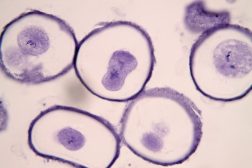Definition
noun
The dye or stain that is used to differentiate one component or cellular structure from another, or to differentiate an entity from another in a specimen. It does so by colouring a portion of a specimen (e.g. of a tissue or of a cell) that remained uncoloured following the first staining using a dye of different color.
Supplement
For instance, in Gram staining, two dyes are used: the Crystal Violet and Safranin. The Safranin is the counterstain used in this method. The Gram Staining is used to distinguish Gram positive bacteria from Gram negative bacteria.
Synonyms:
- contrast stain
- counterstain







